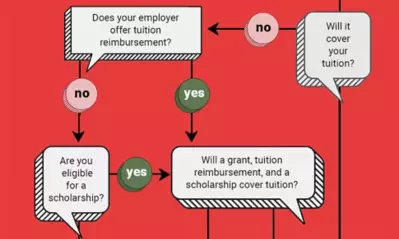Understanding opportunity cost of attending college

Written by Grace Stetson

Reviewed by Chris Conway, Director of Financial Education Initiatives and Repayment Management

Deciding to enroll in college can present a tricky financial concern for many adults. As inflation appears to outpace earnings for many, prospective learners may question the opportunity cost of going to college. Is the chance to further your education, in other words, worth the investment of time and money?
According to economists and data from the past few decades, the benefits of a college degree can affect your career and earning potential in measurable ways. As such, it could be worth assessing your own opportunity cost, and how going to college aligns with your future career planning.
What is "opportunity cost"?
The term opportunity cost refers to the potential loss from making one decision over another. Take, for instance, the decision to eat a salad for lunch today in place of a cheeseburger and fries. The opportunity cost may be the tastiness of the food, but the long-term health gains could make it worth it for you.
For Dr. John Woods, provost and chief academic officer at University of Phoenix, the opportunity cost of returning to higher education should mostly focus on an individual’s future trajectory rather than an immediate result.
“Higher education is still of huge value, but it can do a lot more to make it more obvious what a student is coming away with for their time and their money,” Woods says.
As Woods notes, the benefits of a postsecondary degree — from an associate degree to a doctorate — can lead to higher earnings over one’s lifetime compared to those who have only high school diplomas. Additionally, by enrolling in an online college instead of an in-person option, students can potentially save money while also fitting online courses into their schedule.
“American higher education has a massive diversity of options,” Woods says. “I would encourage people to explore the full spectrum of higher education in their life, whether they’re 17 or 37. They can understand that [many] price points and formats exist and [are] attainable.”
Why is opportunity cost important in relation to a college experience?
As Woods describes, the question of opportunity cost has become more prevalent in recent years because of a few factors.
“There’s the fact that [some] employers are not satisfied by the graduates they’re getting, the newsworthiness of some employers hiring individuals without degrees, and the public’s general dissatisfaction with the value of higher education as decades of cost increases have exceeded the rates of inflation,” Woods explains.
Those factors make individuals suspicious of universities and colleges’ benefits, and that, along with the well-documented enrollment cliff, can impact schools closing or merging with one another to stay afloat. According to Inside Higher Ed, at least 14 nonprofit four-year colleges in the United States announced closures in 2023; at least seven other colleges and universities announced mergers and acquisitions with other institutions.
“This places a lot of pressure [on institutions] and [creates] noise that higher education isn’t doing a good job, which leads to understandable questions,” Woods says.
Understanding the hidden costs of college
College costs aren’t just related to tuition and textbooks. Based on 2024 findings from the Education Data Initiative*, a four-year college program in the United States costs an average of $38,270 per student per year, which has more than doubled in the 21st century. Those rates are higher for the average private, nonprofit university student, estimated to spend $58,628 per academic year.
The added costs of an in-person program can lead to more money out of the student’s pocket to cover housing expenses, transportation, extracurriculars and other basic necessities.
*Cost of attendance does not account for potential lost income, student loan interest or moving expenses.
Maximizing the value of college education
College courses don’t only impart what’s in the textbooks or taught in the lecture hall, of course. The value of higher education also aligns with executive functioning skills.
As Woods shares, that means communication, collaboration with peers and appreciation of differences: “Those are higher on the list of what employers are demanding, which implies that employers should be able to train the technical skills once these individuals are hired.”
Planning for the future and minimizing the opportunity cost
While the price tag of a college degree can feel hefty to many in the short term, the long-term advantages can potentially make up for that initial cost.
However, while more education might help you earn more over your lifetime, it’s not always a guarantee. It’s always a good idea to carefully review the educational requirements of your targeted profession to ensure you’re on the optimal path.
What is the opportunity cost of enrolling in college as an adult?
Online colleges designed for working adults need to consider the unique situation for prospective students. Adults have jobs that require time and attention; many have families to support both emotionally and financially. These constraints mean the value of any investment needs to be clear.
“Adult students are balancing family, work and school, which makes them very discriminating buyers,” Woods says. “They are looking at the value equation to make sense. Higher education institutions can help by making what skills students learn more obvious and transparent, so that these can in turn be communicated to employers more easily.”
As adults consider the benefit of career-relevant skills that a university education offers, they may also be able to reduce the “cost” of such an opportunity by leveraging certain tax breaks. These are the American Opportunity Tax Credit and the Lifetime Learning Credit.
Other ways to offset educational expenses include tuition reimbursement and student loan repayment assistance from their employer.
Use the opportunity cost to determine if college is right for you
University of Phoenix provides students with pathways to get from enrollment to graduation efficiently and affordably.
If reaching your career goals means going back to school, you can assess whether UOPX would work for you. Here are some resources and tools that might help:
- Fixed tuition: UOPX’s Tuition Guarantee means students lock in one rate when they enroll, and that rate won’t change during their degree program.
- Savings Explorer® tool: Prospective students can use this tool to identify how they can use previous college credits, U.S. military experience, and relevant work and life experiences to qualify for credit toward their degree program.
- Employer tuition benefits: Employed adults may be eligible for tuition assistance or reimbursement from their employers.
Ask for more information to help determine the opportunity costs associated with your enrollment at UOPX.
Read more articles like this:

ABOUT THE AUTHOR
Grace Stetson is a freelance journalist and communications strategist dedicated to sharing vital stories with the greater Santa Cruz Community. She writes for various universities and publications throughout the Bay Area, and she coordinates political campaigns in Santa Cruz County. When not at work, Grace is volunteering at the SPCA or Second Harvest, exercising or getting lost in nature with a good audiobook.

ABOUT THE REVIEWER
As Director of Financial Education Initiatives and Repayment Management, Chris Conway works with departments across the University to provide resources that allow students to make more informed financial decisions. She is also an adjunct faculty member for the Everyday Finance and Economics course at the University, and she chairs the National Council of Higher Education Resources College Access and Success Committee. Conway is committed to helping college students make the right financial decisions that prevent future collection activity.
This article has been vetted by University of Phoenix's editorial advisory committee.
Read more about our editorial process.


